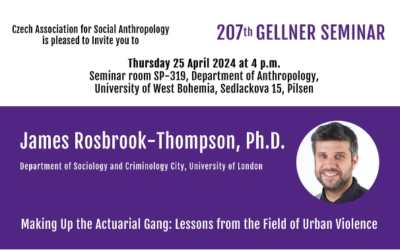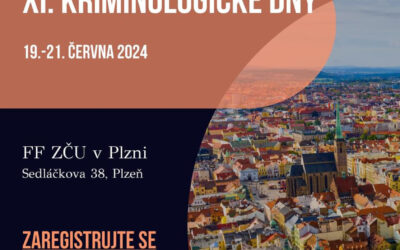Aktuality a novinky
KSA spolupořadatelem 207. Gellnerovského semináře – 25. 4. 2024 od 16:00 v učebně SP319
Česká asociace pro sociální antropologii ve spolupráci s Katedrou antropologie FF ZČU v Plzni vás...
Konference: XI. KRIMINOLOGICKÉ DNY 19.-21.6.2024
V druhé polovině června se na děkanátu a jeho okolí uskuteční konference Kriminologické dny....
KATEDERNÍ SEMINÁŘE – PŘEDNÁŠKA DR. NIKOLA SÁL V ÚTERÝ 9. 4. 2024 OD 14:00 V UČEBNĚ SO-118
I když možná nezahlédnete inzeráty přímo hledající antropology, neznamená to, že pro vás...
Nové číslo AntropoWebzinu KSA je tady!
Když se Velikonoce blíží, v Norsku se lidé těší na påskekrim, detektivky čtené právě v tento čas....
NOVÁ TAJEMNICE KATEDRY
Na vědomost se dává, že naše milá tajemnice Ing. Gabriela Prášková odchází na mateřskou...
KATEDERNÍ SEMINÁŘE – PŘEDNÁŠKA DR. DANIELA SOSNY V ÚTERÝ 26.3. 2024 OD 14:00 V UČEBNĚ SO-118
Přijďte příští úterní odpoledne na další katederní seminář, kde vám Daniel Sosna představí, jak se...
události
Duben 2024
Úterý 23. 4.
- 14:00 – 16:00
- KSA seminář: Ájurvéda jako nástroj jedince v boji proti tlakům pozdně moderní společnosti
Čtvrtek 25. 4.
- 16:00 – 18:00
- Gellnerovský seminář
Úterý 30. 4.
- Celodenní
- Deadline odevzdání AP
Květen 2024
Středa 1. 5.
- Celodenní
- Svátek práceČesko
Úterý 7. 5.
- 14:00 – 16:00
- KSA seminář: Budhismus a konzumerismus
Studijní obory, které můžete u nás studovat
Magisterský program
Dvouletý navazující program je určen zájemcům s ukončeným bakalářským společenskovědního vzděláním. Obsahuje přehled základních teorií, přístupů a témat rozvíjených současnou sociální a kulturní antropologií
Doktorský program
Doktorský program je zaměřen na etnologickou a antropologickou problematiku při plném zohlednění interdisciplinárního přesahu. Cílem je příprava zájemců o vědeckou a pedagogickou činnost se zaměřením na etnologii a antropologii.





